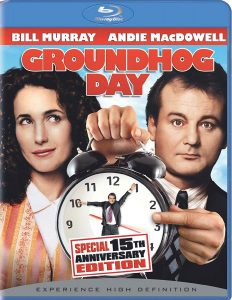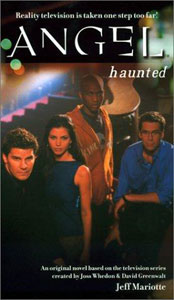In my first reading of the “Angel” novel “Haunted” (February 2002), I probably wasn’t thrilled with the reality-TV focus. That was the era when a lot of good shows were being canceled to make room for cheaper and more profitable reality TV. Such fears seem silly today when there are more good scripted shows than ever.
One recent scripted show is Season 6 of “American Horror Story,” subtitled “Roanoke” (2016). While not particularly good, “Roanoke” has the clever premise of going into multiple layers of meta, in part telling a story of people who stay in haunted house for the sake of a reality TV show.
Jeff Mariotte got there 14 years earlier with this novel, where Cordelia is among the contestants in the aptly named “Haunted House,” which she hopes will jump-start her career. (Similarly, she takes a role in a “found footage” movie in the Dark Horse Presents comic story “Lovely, Dark and Deep.”)
“Haunted” is hampered a bit by the fact that it’s hard to write a horror story in the Buffyverse. That may sound strange, but with everyone so familiar with monsters, ghosts and so forth, it’s hard to set a scary mood. Indeed, Cordy literally lives with a ghost, and she thinks that experience will help her win the contest, which requires staying in the house longer than her fellow contestants.
Those fellow contestants don’t pop off the page too much, so it’s mostly Cordy who makes those chapters engaging, along with occasional time-capsule elements when Mariotte writes about the early days of synergy between TV shows and their websites (the production has cameras all over the house, for the purposes of web streaming).
Meanwhile, Angel, Gunn and Wesley are pursuing dual mysteries: a missing woman (who is still alive, since Angel can’t enter her apartment), plus a corpse dumped near the Hyperion Hotel whose features are burned off with acid. This is the first post-Doyle “Angel” novel, jumping all the way to the time in Season 2 after Angel had gone dark and fired his team; now they’re back together, with Wes as the boss. Between the natural tension between our heroes and Mariotte getting a feel for this new Angel Investigations dynamic, the banter feels slightly cold.
Unlike the haunted house thread, the case of the missing woman – which we as readers are privy to – is quite creepy. In a thread that would’ve fit well on “The X-Files,” the woman undergoes a complex magical and scientific process of being mind-swapped – which is much more wiggins-inducing than being flat-out killed.
Mariotte has a strong sense of where the saga is at in late Season 2, even if he can’t escape the stiffness between our heroes at this time. Recently, Kate had lost her job for digging too much into the supernatural, so the author wisely assumes this must’ve happened many times before in L.A. Gunn smartly tracks down ex-cops – including one he had actually befriended from past run-ins – and discovers this is not the first case of a dumped corpse with burned-off features with corresponding missing women. Mariotte also does solid writing about Wolfram & Hart, including Lilah.

There’s also an ever-so-slight sense that Angel is developing a thing for Cordelia. And while it’s too early for Lorne to be a full member of the team, Mariotte does bring him into play; at this time, he’s simply known as The Host. And Anne, the youth-home worker who started on “Buffy” and became an “Angel” supporting player, also fits into the investigation nicely.
Ultimately, “Haunted” doesn’t have much of an effect on the main characters – as is often the case in spinoff fiction – but while Cordy’s haunted house experience feels standard, the other mystery is strong, and it’s nice to see all those supporting players.
Click here for an index of all of John’s “Buffy” and “Angel” reviews.

